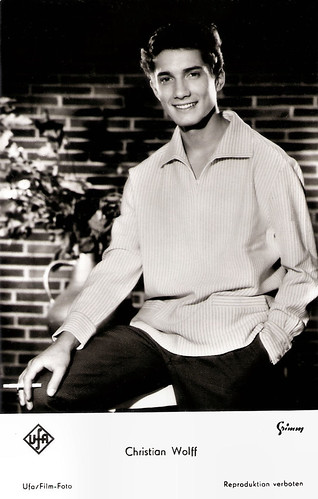
German postcard by Ufa, Berlin-Tempelhof, no. FK 4713. Retail price: 25 Pfg. Photo: Arthur Grimm / Ufa.
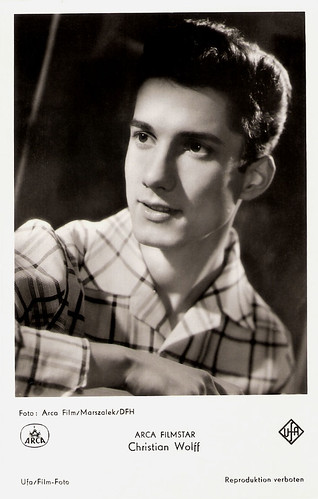
German postcard by Ufa, Berlin-Tempelhof, no. FK 4170. Retail price: 25 Pfg. Photo: Arca Film / Marszalek / DFH. Publicity still for Es war die erste Liebe/It was the first love (Fritz Stapenhorst, Veit Harlan, 1958).
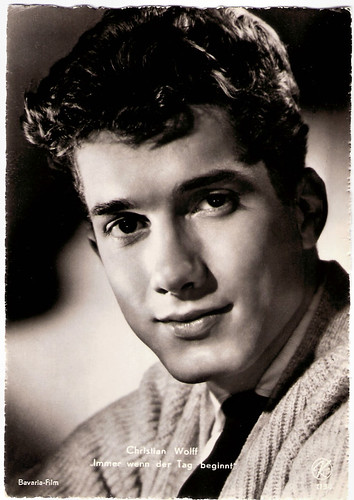
Austrian postcard by Kellner-Fotokarten, Wien, no. 81066. Photo: Bavaria-Film. Publicity still for Immer wenn der Tag beginnt/Always when the day starts (Wolfgang Liebeneiner, 1957).
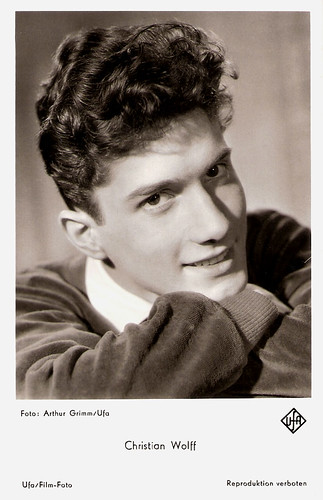
German postcard by Ufa, Berlin-Tempelhof, no. FK 3645. Retail price: 25 Pfg. Photo: Arthur Grimm / Ufa.
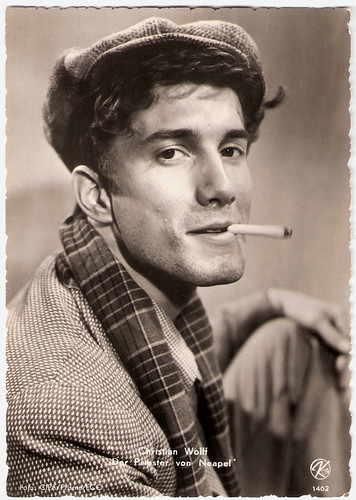
Austrian postcard by Kellner Fotokarten, Wien, no. 83466. Photo: CIFA / Prisma / FCC. Publicity still for Il bacio del sole/Don Vesuvio (Siro Marcellini, 1958).
Anti-gay
Christian Wolff was born in Berlin in 1938.
Between 1955 and 1957 he studied at the renowned Max-Reinhardt-Schule.
His teacher Hilde Körber helped him to get his first film role opposite Paula Wessely and Paul Dahlke in the anti-gay film Anders als Du und Ich/Bewildered Youth (Veit Harlan, 1957).
The film was made by the notorious Veit Harlan, director of Nazi-propaganda-films like Jud Süß/Jew Süss (1940) and Kolberg (1945).
The film portrays homosexuality as evil and even diabolic. Wolff plays young Klaus, who is drawn to his friend Manfred and explores the underground world in post-war Berlin of gay clubs and electronic music.
His family begins to learn of his other life and does everything to set him straight. The film was shortly after its premiere forbidden.
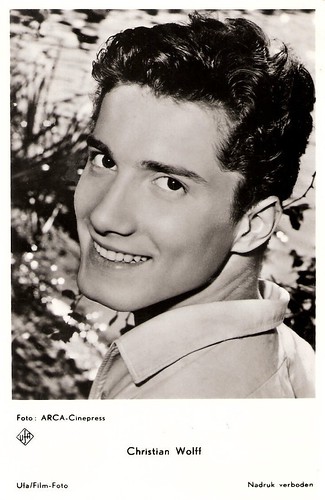
Dutch postcard by Gebr. Spanjersberg N.V., Rotterdam, no. 4268. Photo: Arca / Cinepress. Gebr. Spanjersberg N.V. was the licency holder for UFA postcards in the Netherlands.

Christian Wolff and Marion Michael. Dutch postcard by Gebr. Spanjersberg N.V., Rotterdam (licency holders for UFA postcards in the Netherlands), no. 4267. Photo: ARCA-Cinepress.
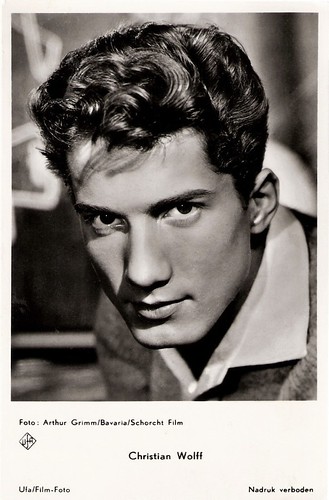
Dutch postcard by Gebr. Spanjersberg N.V., Rotterdam, no. 3846. Photo: Arthur Grimm / Bavaria / Schorcht Film.
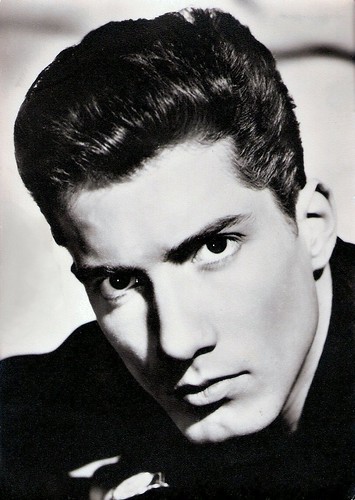
German postcard by Kolibri-Verlag, Minden/Westf., no. 038. Photo: Berolina / Kurt Schulz / Union / Stempka.
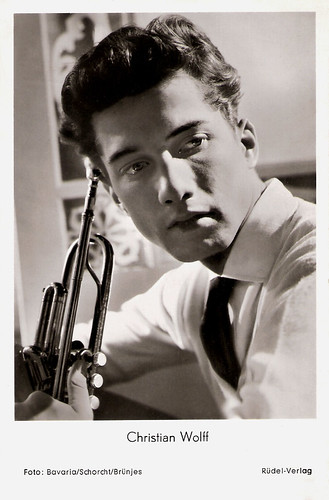
German postcard by Rüdel-Verlag, Hamburg-Bergedorf, no. 2365. Photo: Bavaria / Schorcht / Brünjes.
Young Romantic Lover
Christian Wolff followed this controversial début up with films like Die Frühreifen/The Prematures (Josef von Báky, 1957) with Heidi Brühl, and Es war die erste Liebe/First Love (Fritz Stapenhorst, 1958) opposite Marion Michael.
In these films he was often typecasted as the young, romantic lover.
A bit more mature were his parts in Der Schinderhannes/Duel in the Forest (Helmut Käutner, 1958) with Curd Jürgens, the war drama Kriegsgericht/Court Martial (Kurt Meisel, 1959), and Der blaue Nachtfalter/The Blue Moth (Wolfgang Schleif, 1959) opposite Zarah Leander.
Then he was again typecast as a lonely prince in the romance Alt Heidelberg/Old Heidelberg (Ernst Marischka, 1959) with Gert Fröbe and Sabine Sinjen.
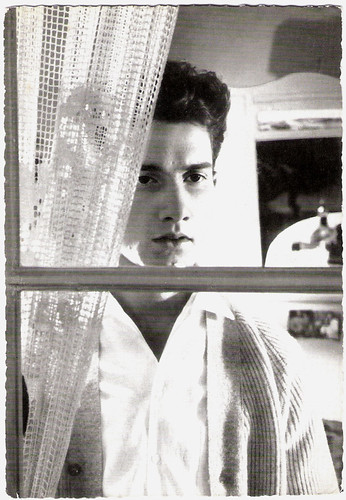
German postcard by WS-Druck, Wanne-Eickel, no. 339. Photo: Bavaria. Publicity still for Immer wenn der Tag beginnt/Always when the Day starts (Wolfgang Liebeneiner, 1957).
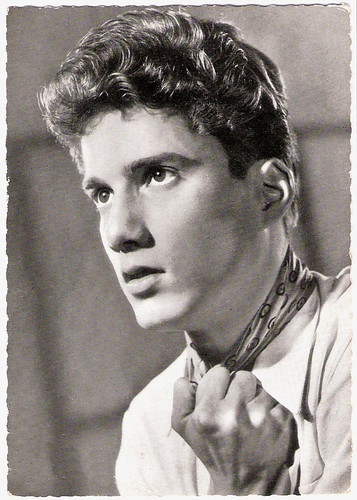
German postcard by Filmbilder-Vertrieb Ernst Freihoff, Essen. Retail price: 10 Pfg. Photo: Arthur Grimm / Ufa.
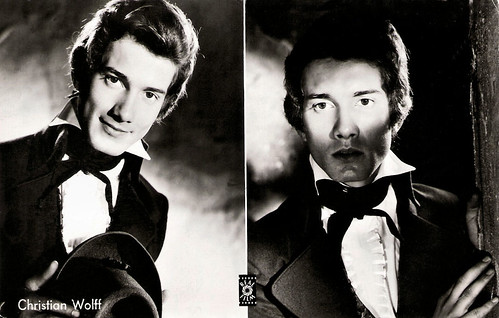
German postcard by Rüdel-Verlag, Hamburg-Bergedorf, no. D 2548. Photo: Real / Europa / Gabriele. Publicity stills for Der Schinderhannes/Duel in the Forest (Helmut Käutner, 1958).
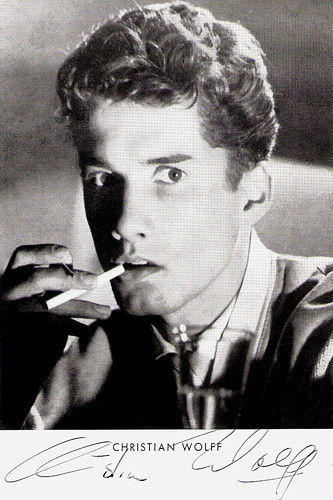
German autograph card.
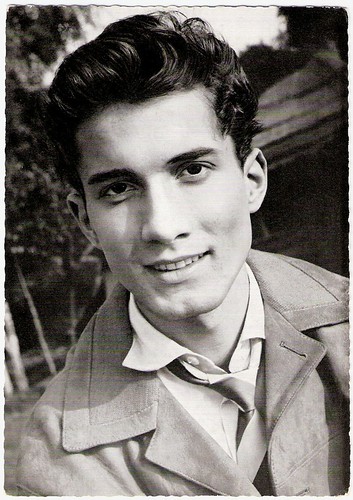
German postcard by Filmbilder-Vertrieb Ernst Freihoff, Essen, no. 612. Retail price: 10 Pfg. Photo: Lothar Winkler.
Forsthaus Falkenau
His breakthrough was his role as the student Fabian König in the crime drama Verbrechen nach Schulschluss/The Young Go Wild (Alfred Vohrer, 1959). The then 21-years old actor won the Critics Award at the San Sebastian Film Festival.
His next film, the crime film Am Tag als der Regen kam/The Day It Rained (Gerd Oswald, 1959), was also a success.
In the 1960s followed more popular films like the Carl Zuckmayer adaptation Die Fastnachtsbeichte/The Carnival Confession (William Dieterle, 1960), Via Mala (Paul May, 1961) and Rheinsberg (Kurt Hoffmann, 1967) with Cornelia Froboess.
In 1958 he made his stage debut in a Shakespeare play and until the 1980s he had engagements with theatre companies in Berlin, Düsseldorf and Munich. On stage he easily alternated classic with modern plays.
In the 1970s he also started a busy television career. He did many guest performances and became a popular TV star in the long-running hit series Forsthaus Falkenau (1989-2006). In a final feature episode Entscheidung in der Savanne (Marcus Ulbricht, 2006) his character left his farm in Falkenau for a new farm in Southern Africa, which he had inherited.
Next to his acting jobs, Christian Wolff synchronized Pierre Brice in the Winnetou films, Alain Delon and Anthony Perkins.
Christian Wolff married actress Corny Collins in 1959 and later remarried with Marina Handloser. His son Patrick Wolff is also an actor.
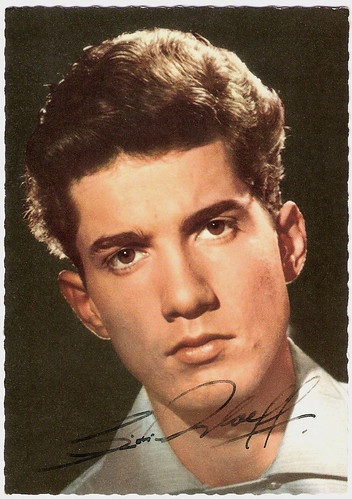
German postcard by Ufa, Berlin-Tempelhof, no. CK-256. Retail price: 30 Pfg. Photo: Stempha / ARCA Film.
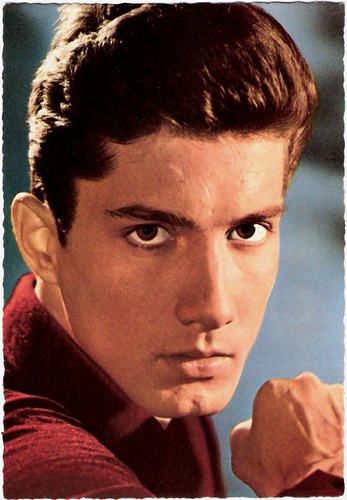
German postcard, no. F 152.
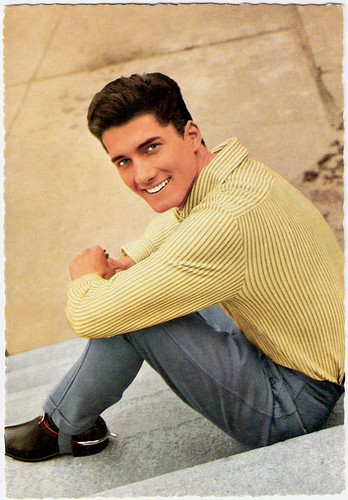
German postcard by WS-Druck, Wanne-Eickel, no. F 167.
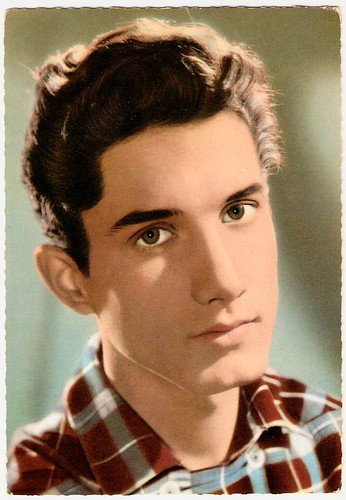
German postcard by ISV, no. D 28.
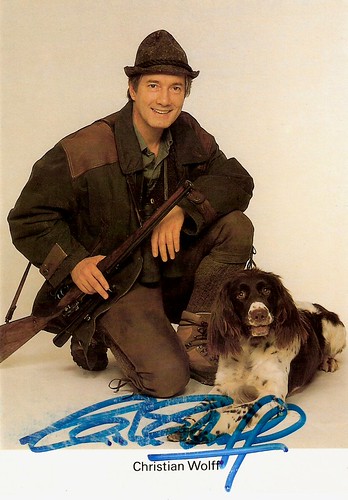
German promotion card by NDF. Photo: Bildarchiv Engelmeier. Still for Forsthaus Falkenau.
Sources: Steffi-line.de, Wikipedia and IMDb.
No comments:
Post a Comment